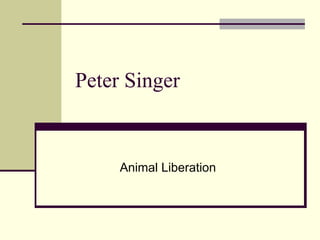Lesson 4
This document summarizes Peter Singer's arguments against speciesism and for animal rights. It notes that while Eastern religions consider all living things, Western religions do not view harming animals as inherently wrong. Current animal cruelty laws are based on the assumption that animals are property and lower than humans. However, qualities like intelligence or skin color are not reasons for unequal treatment among humans. If capacity to suffer is the standard for moral consideration, then this would include non-human animals like mice but exclude things like stones. While animals should not necessarily have all the same rights as humans, inflicting pain on them that causes equal suffering is wrong. The document raises issues like killing animals, using them in research, and eating them as food. It

Recommended
Recommended
More Related Content
What's hot
What's hot (20)
Lesson 4
- 2. Animal Suffering Idea of compassion in Buddhist and Hindu thought – towards all living things Nothing compatible in Western religions. Nothing inherently wrong in making animals suffer – said Aquinas Animals are thought of as nothing but ‘property’. And as such, there is nothing that protects them. Just as I can break my pencil, which is my property, I can break the neck of my chicken, which is also only my property (for example).
- 3. Animal Cruelty Law There are laws against animal cruelty, but these don’t protect animals in most cases. These laws are also based on an assumption that animals are lower than humans, and they need ‘protection’ Some began questioning: Why do we assume that human interests must always prevail?
- 4. Humans There are a wide variety among human beings: different skin color, shape, size, different intellectual ability, sensibility, sensitivity, etc. Equality of humans does not (or should not) depend on these qualities. Considerations for each other (as humans) should not depend on these qualities. There were times in the past (perhaps still in some cases today) where groups of humans were treated as we treat non-human animals today.
- 5. Different capacities What gives humans the right for equality? Is it the capacity to speak? Capacity to be happy? Capacity to suffer? If it is the capacity to suffer, we need to include non-human life animals. We may exclude stones, for example, because a stone can’t suffer. But we need to include mice, for example, because they can suffer.
- 6. Same rights? Does it mean the animals should have the same rights as humans? No. We must be reasonable. But, inflicting pain, that would cause the same amount of suffering to animals as it would proportionally to humans, is wrong. This reasoning applies to experimentation with non-human animals, as well.
- 7. Other issues How about killing animals? How about choosing to take a life of animals vs. humans? How about using animals as tools for research? What to think about animals as food?
- 8. Speciesism What is the meaning of speciesism, the way it is used in the article?